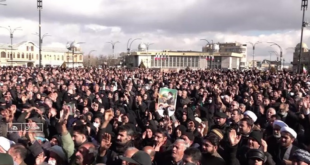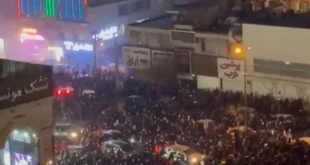NAUDERO, Pakistan – Benazir Bhutto’s 19-year-old son — a student with no political experience — was named symbolic leader of her party Sunday, while her husband took effective control, extending Pakistan’s most enduring political dynasty.
The major parties appeared to agree that the elections should take place as scheduled on Jan. 8 despite street violence and political turmoil triggered by the assassination of Bhutto. The Election Commission is to discuss the timing of the polls Monday.
A successful vote would bolster U.S.-backed plans to restore democracy to the nuclear-armed country as it battles rising Islamic extremism.
Rioting subsided Sunday after destruction that left at least 44 dead and caused tens of millions of dollars in damage, but bitterness remained over the government’s response to the gun and suicide attack that killed Bhutto.
The appointment of Bhutto’s husband, Asif Ali Zardari, was not without its own complications. A former Cabinet minister who spent eight years in prison on corruption accusations, he is known as “Mr. 10 Percent” for allegedly taking kickbacks and is viewed with suspicion by many Pakistanis.
At a news conference on Sunday, Zardari said the opposition party — Pakistan’s largest — had no confidence in the government’s ability to bring the killers to justice and urged the United Nations to establish a committee like the one investigating the 2005 assassination of former Lebanese Prime Minister Rafik Hariri.
The decisions on the future of Bhutto’s Pakistan Peoples Party were made at a closed-door meeting in the sprawling family estate in the south of the country where the two-time former prime minister grew up.
The eldest of Bhutto’s three children, Bilawal Zardari, accepted the party’s leadership, but said he would remain at Oxford University.
He said his father, who was officially designated co-chairman, would be the effective party leader.
“The party’s long struggle for democracy will continue with renewed vigor,” Bilawal told a news conference that was repeatedly interrupted by emotional chants from Bhutto’s supporters. “My mother always said democracy is the best revenge.”
Bhutto’s grandfather was a senior figure in the movement that helped Pakistan split from India and lead it to independence in 1947. Her father — Pakistan’s first elected prime minister — founded the Pakistan Peoples Party in 1967 and its electoral success since then has largely depended on the Bhutto name.
Bilawal said that Zardari would “take care” of the party while he continued his studies. Zardari then told reporters to direct questions at him, saying his son was at a “tender age.”
Zardari, who spent eight years under detention on corruption charges in Pakistan before his release in late 2004, is a power broker who served as investment minister in Bhutto’s second government. He has denied the graft charges.
He immediately announced the party’s participation in the elections, perhaps sensing sympathy for Bhutto and her family could translate into a strong performance in the polls, but said another party leader, Makhdoom Amin Fahim, would likely be their candidate for prime minister if they won.
He also appealed to the party of former Prime Minister Nawaz Sharif to reverse an earlier decision to boycott the polls. Sharif’s party later agreed.
“It is up to the political parties in Pakistan to choose their leaders,” White House spokesman Scott Stanzel said from Crawford, Texas, where President Bush is vacationing.
“We believe it is important for Pakistan to confront extremists and continue on the path to democracy by holding free and fair elections,” he said. “The timing of those elections will be up to the Pakistanis.”
Tariq Azim, a spokesman for the pro-government Pakistan Muslim League-Q party, congratulated the decision to against seeking a delay in the vote.
“We welcome it, and we are also ready for the contest on Jan. 8,” he said after earlier predicting the election may be delayed up to four months.
The British and U.S. governments had been pushing Bhutto, a moderate Muslim seen as friendly to the West, to form a power-sharing agreement with President Pervez Musharraf after the election — a combination seen as the most effective in the fight against al-Qaida, which is believed to be regrouping in the country’s lawless tribal areas.
But many of her supporters have alleged that political allies of Musharraf were behind her killing, which the government has blamed on Islamic militants with links to al-Qaida.
A statement from the British government said Musharraf had agreed to consider “potential international support” to the Pakistani investigation into the assassination, but gave no more details. It also urged Pakistan to go ahead with elections without any “significant delay.”
Zardari rejected as “lies” the government’s account of how his wife died, amid a dispute over whether she sustained fatal gunshot wounds or was killed by the force of the suicide blast that struck her vehicle as she left a campaign rally on Thursday.
At Zardari’s insistence, Bhutto was buried without an autopsy and the debate over her cause of death has undermined confidence in the government and further angered her followers.
No fresh rioting was reported Sunday and Zardari urged supporters to show restraint.
“God willing, when it is the Peoples Party’s reign, when the Peoples Party government is formed, then we would have taken revenge for Bibi’s blood and that blood would not have gone waste,” Zardari said, referring to his late wife by her nickname.
 Eurasia Press & News
Eurasia Press & News



